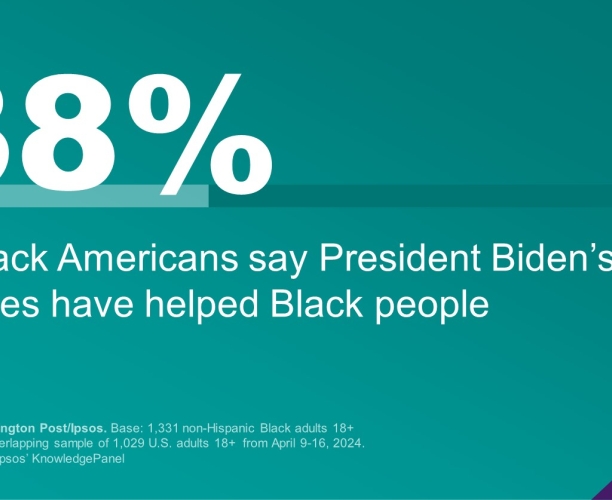

Most Black Americans continue to support Joe Biden
Washington DC, June 18, 2024--The latest Washington Post/Ipsos Survey of Black Americans finds that in the 2024 presidential race, the majority of the Black community continues to support President Joe Biden. Biden has an edge over former President Donald Trump on topics of personal favorability, job performance, and personal attributes. However, lower stated interest in voting relative to 2020 and a slightly narrower gap in standing present some warning signs for the Democrat who likely needs a strong margin of victory from Black voters to win re-election.
Black Americans, by a large majority, prefer Joe Biden to Donald Trump.
- When asked who they would be likely to vote for, 42% of Black Americans say they will definitely vote for Joe Biden compared to 4% for Donald Trump or 1% for Robert Kennedy Jr.
- Three in five (62%) of Black Americans report a favorable impression of Biden compared to 14% holding a favorable impression of Trump.
- On issues of the economy, crime, abortion, racism, or the war between Israel and Hamas, Black Americans trust Biden at least 3 to 1 over Trump.
- 38% of Black Americans report Biden’s policies have helped Black people (up from 34% in 2023), 13% report the same of Trump when he was President.
However, some cracks are appearing in Biden’s support in the Black community.
- Despite a significant majority viewing Biden more favorably than Trump, that margin of favorable sentiment has declined from a 55 percentage point advantage in 2022 to a 48 point advantage now.
- Also, while most Black Americans continue to say that Trump is biased against Black people (77%), that number has also come down 10 points from 2020 (87%) while the percent saying Biden is biased has climbed 6 points from 17% in 2020 to 23% now.
- With Biden needing significant support from Black voters, the finding that only 62% currently report that they are absolutely certain to vote is a warning sign compared to the 74% reporting the same in June 2020.
- Despite recent attacks on DEI programs, most Americans (61%) continue to approve of companies taking steps to address inequalities. Support for DEI programs increase (69%) when people are given a more detailed definition “programs to hire more employees from groups that are underrepresented in their workforce, such as racial and ethnic minorities and people with disabilities and to promote equity in the workplace.”
- A majority of Americans believe DEI programs help workers with disabilities, Black workers, Hispanic workers, LGBTQ workers, and female workers. A majority also say that DEI programs neither help nor hurt (or have no opinion) them personally, male workers, and white workers.
- Americans are most supportive of DEI measures like mentorship, recruitment strategies, or trainings. Americans do not support financial incentives for executives to hit diversity targets.
About the Study
This poll was jointly sponsored and funded by The Washington Post and Ipsos. The poll includes a random sample of 1,331 non-Hispanic Black adults in the United States, as well as a partially overlapping sample of 1,029 U.S. adults overall. Interviews were conducted in English and Spanish.
The questionnaire was administered with the exact questions in the exact order as they appear in this document. Demographic questions are not shown. If a question was asked of a reduced base of the sample, a parenthetical preceding the question identifies the group asked. Phrases surrounded by parentheticals within questions indicate clauses that were randomly rotated for respondents.
Ipsos conducted sampling, interviewing and tabulation for the survey using the KnowledgePanel, a representative panel of adults age 18 and over living in the United States. KnowledgePanel members are recruited through probability sampling methods using address-based sampling. Panel members who do not have internet access are provided with a tablet and internet service.
This survey uses statistical weighting procedures to account for deviations in the survey sample from known population characteristics, which helps correct for differential survey participation and random variation in samples. The overall sample and the non-Hispanic Black sample were weighted separately to match the makeup of the respective population demographics by sex, age, education, region, metropolitan status, household income, and 2020 presidential vote choice. The overall sample included an additional adjustment for race/ethnicity. The demographic benchmarks came from the Census Bureau’s 2022 American Community Survey while benchmarks for metropolitan status were from the Census Bureau’s March 2023 Supplement of the Current Population Survey. Additionally, the 2020 vote choice benchmarks for the overall sample were obtained from the Federal Election Commission’s Official 2020 Presidential General Election Results. For the sample of Black Americans, turnout benchmarks were from the U.S. Elections Project and vote choice benchmarks from an average of post-6 election estimates from the NEP exit poll, AP VoteCast, Pew validated voter survey and Catalist.
The margin of sampling error for the sample of non-Hispanic Black adults is plus or minus 3.2 percentage points, the overall sample is plus or minus 3.2 percentage points. All error margins have been adjusted to account for the survey’s design effect, which is 1.4 for results among Black adults and 1.1 for the overall sample of adults. For results based on other subgroups, the margin of sampling error may be higher. Note that sampling error is only one of many potential sources of error in this or any other public opinion poll.
Group Sample size Error margin
Black adults 1,331 +/- 3.2 points
U.S. adult comparison sample 1,029 3.2
White adults 703 3.9
2023 Survey: https://www.ipsos.com/en-us/black-americans-are-not-enthusiastic-about-their-choices-2024
2022 Survey: https://www.ipsos.com/en-us/news-polls/washington-post-ipsos-may-2022-survey-black-americans
June 2020 Survey: https://www.ipsos.com/en-us/news-polls/thewashingtonpost-police-protest-race-062420
January 2020 Survey: https://www.ipsos.com/en-us/news-polls/WP-black-american-trends-2020
For more information on this news release, please contact:
Chris Jackson
Senior Vice President, US
Public Affairs
+1 202 420-2025
[email protected]
About Ipsos
Ipsos is one of the largest market research and polling companies globally, operating in 90 markets and employing over 18,000 people.
Our passionately curious research professionals, analysts and scientists have built unique multi-specialist capabilities that provide true understanding and powerful insights into the actions, opinions and motivations of citizens, consumers, patients, customers or employees. Our 75 solutions are based on primary data from our surveys, social media monitoring, and qualitative or observational techniques.
Founded in France in 1975, Ipsos is listed on the Euronext Paris since July 1st, 1999. The company is part of the SBF 120 and the Mid-60 index and is eligible for the Deferred Settlement Service (SRD).
ISIN code FR0000073298, Reuters ISOS.PA, Bloomberg IPS:



